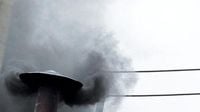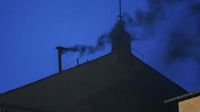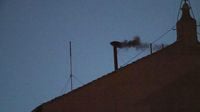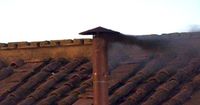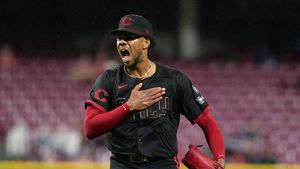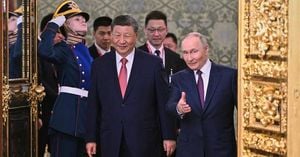VATICAN CITY — The highly anticipated conclave to elect a new pope began on May 7, 2025, but the first ballot ended without a decision, as black smoke billowed from the chimney of the Sistine Chapel, signaling that the 133 cardinal electors failed to reach the necessary two-thirds majority. The smoke emerged at 9 p.m. local time, two hours later than expected, after the cardinals had processed into the chapel, taken their oaths of secrecy, and cast their votes.
The conclave marks a significant moment for the Roman Catholic Church, which counts approximately 1.4 billion members worldwide. The cardinals are tasked with selecting a successor to Pope Francis, who passed away earlier this year.
As the crowd gathered outside St. Peter's Square, the excitement was palpable. Estimates suggest that around 30,000 people filled the square, many holding flags from various countries, including the Philippines, Brazil, and the United States. Among them was Maggie Popp from North Dakota, who expressed her enthusiasm for the event. "We're here as a family because it feels like a once-in-a-lifetime opportunity," she said. "Even if they won't remember, I want my boys to experience this and pray for our new Holy Father."
Gabrielle Estrada from San Antonio, Texas, extended her European trip to witness the conclave firsthand. "I grew up Catholic, so I remember watching the smoke on TV and thought it would be so cool to be here," she shared. Estrada added that she hopes the new pope will engage young adults in the faith, a demographic that often strays from religious practices.
Father Anthony Saiki, a priest from the Archdiocese of Kansas City, remarked on the significance of the moment. "Rome, right now, is the center of the universe," he said. "All eyes are on the church, looking for the next successor of Peter. It's a moment of hope, excitement, and joy."
The conclave tradition, which dates back centuries, involves a series of ballots where candidates must secure 89 votes to be elected. If no pope is chosen after three days, the cardinals may take a day for prayer and discussion. Historically, notable popes like Benedict XIV and Francis were elected on the fourth and fifth ballots, respectively.
The first round of voting concluded without success, leading to the expectation of further ballots in the coming days. The cardinals will convene again on Thursday morning, May 8, 2025, for another round of voting, with plans to cast up to four ballots daily until a new pope is elected.
As the first day of the conclave wrapped up, speculation about potential candidates began to swirl. The identity of the next pope remains a closely guarded secret, but many are eager to see how the new leader will address contemporary issues facing the church, including the engagement of younger generations and the church's role in a rapidly changing world.
The tradition of using smoke signals to communicate the outcome of the votes has evolved over the years. The first documented use of this signaling system dates back to the 19th century, with evidence of smoke being used as early as 1823. The smoke comes from burning the ballots and any notes taken by the cardinals, with a more reliable system implemented in 2005 to ensure clarity in signaling the results.
In recent conclaves, special cartridges have been used to enhance the color of the smoke, allowing for a clear distinction between black and white signals. This method was designed to prevent confusion, as seen during the 1958 conclave when white smoke mistakenly appeared twice, leading to chaotic reports and false alarms.
As the cardinals prepare for another day of deliberations, the world watches closely, hoping for a new leader who will guide the Catholic Church through its current challenges. The anticipation in Vatican City is palpable, with pilgrims, journalists, and curious onlookers flocking to witness this historic moment.
Deacon Nicholas Nkoronko from Tanzania, who was among those gathered in St. Peter's Square, expressed the collective sentiment of many: "Our role here is to pray and to join with other Christians, other Catholics, to pray for the Holy Spirit to guide the whole process. Wherever the new pope comes from, we need a holy Pope who will guide the Church and be its pastor."
As the conclave continues, the hopes and prayers of millions rest on the shoulders of the cardinal electors, who will determine the future direction of the Catholic Church in these transformative times.
